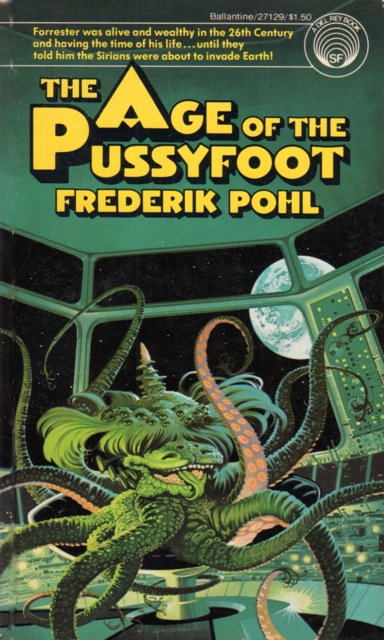
Age of the Pussyfoot by Frederik Pohl (1966/1969)
Review by Brown Robin: This is an old favorite; I’m happy to report it’s still a favorite. As usual, there are spoilers herein.
Twentieth-century suburban peasant Charles Forrester is brought back to life in the 26th century, after dying horribly and being stored at liquid helium temperatures. He has an awful lot of learning to do to survive in the brave new world he is reborn into, but he’s a slow learner….
He meets Adne cute at his resurrection party, is murdered by a Martian gang, resurrected by the doctors again, hired by an ET, fired by the ET, goes on the lam with the Forgotten Men who live without technological trappings, hunted by that pesky Aresian, is hypnotized into helping his former ET employer escape house arrest, and saves humanity from the Ned Lud society and the Sirians.
You might be induced to strangle Forrester as he blithely stumbles into trouble after peril after contretemps due to his inability to focus on the basics, but I forgive him because it’s difficult to be confronted with new technology without a real support system. The future here is no utopia, it is our world, with its pretensions, its perils, its perquisites, its picayune peeves. In short, it’s Sartre’s hell.
This is Fred Pohl in full Galaxy mode, not a slap-dash effort at satire with a glib denouement and a pivot to the next story. There’s quite a bit of detail and texture providing much food for thought. I especially found the passages about the nature of inflation insightful: if a person as primitive as Forrester, as primitive as I was when I was a child, were willing to forego the high tech lifestyle of the truly advanced human ape, they could still survive on very little money, but the modern condition is prohibitively expensive and requires a little hustle, like living in San Francisco or New York or Tokyo takes today.
Adne provides a good foil for Forrester, as well as an introduction for the reader to a future in which the social contracts have been meaningfully and beneficially shifted. Her children are a hoot, a savvy yet still childish brace of gentle smart-alecks you might encounter at your next family reunion. I enjoyed all the characters in this novel, and the Hawksish dialogue too.
I thought “crawling,” where citizens abase themselves, and commit slander against one another in a drug-induced fugue state sounded like something someone is already organizing on weekends in New Jersey or LA.
In addition to being a witty, droll story, it is a perspicacious prognostication. It seems the Earth has been coasting on a crowd sourced machine-run government, years before the word “crowd source” was coined. It has the feel of our present, the way our excessive casuality, our addictive relationship to play and frivolity, our obsessive need of comfort, convenience, and checking-out from the hard moments have formed a kind of decadent artifice fronting a rotting essence. With just a hint of chaos theory.
The story presents functional immortality, allowing for a system of murder and resurrection through legal means and great fungible wealth, and the human psyche has not yet adapted to such vistas, even in the 26th century. The moment real death faces them, nearly every single human runs to the freezers.
Age of the Pussyfoot remains possibly my pick for best twentieth century sf novel. And funny as ever, if not funnier.
Discover more from File 770
Subscribe to get the latest posts sent to your email.

Is this the Pohl that predicted smartphones in all but name?
Yes, and immersive video games of the Mass Effect variety. Visionary…or maybe just lucky.
Thank you
Haven’t read this in ages, good to hear that it still holds up.
The time frame of the story is funny from our remove. I’m sure Pohl would have thought it incredible that his vision would be contemporaneous with 2020, and sensibility set it 500 years hence. Although the future world is definitely a stagnant one, and you could argue it’s possible all the cool stuff will just stop coming out once everyone gets comfortable. Eventually no one will be interested in moving fast or breaking things.
A similar story I may review eventually is Tanith Lees don’t bite the sun/drinking sapphire wine. She also eerily captures our contemporary world, or the zeitgeist of it, at least, but from a hipper angle. I remember it being funny, but a reread will determine that.